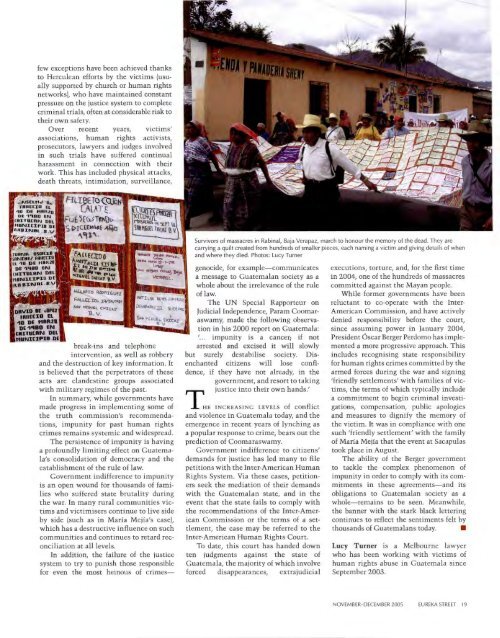0 - Eureka Street
0 - Eureka Street
0 - Eureka Street
You also want an ePaper? Increase the reach of your titles
YUMPU automatically turns print PDFs into web optimized ePapers that Google loves.
few exceptions have been achieved thanks<br />
to Herculean efforts by the victims (usually<br />
supported by church or human rights<br />
networks), who have maintained constant<br />
pressure on the justice system to complete<br />
criminal trials, often at considerable risk to<br />
their own safety.<br />
Over recent years, victims'<br />
associations, human rights activists,<br />
prosecutors, lawyers and judges involved<br />
in such trials have suffered continual<br />
harassment in connection with their<br />
work. This has included physical attacks,<br />
death threats, intimidation, surveillance,<br />
Su rvivors of massacres in Rabinal, Baja Verapaz, march to honour the memory of the dead. They are<br />
carrying a quilt created from hundreds of smaller pieces, each naming a victim and giving details of when<br />
and where th ey died. Photos: Lucy Turner<br />
break-ins and telephone<br />
intervention, as well as robbery<br />
and the destruction of key information. It<br />
is believed that the perpetrators of these<br />
acts are clandestine groups associated<br />
with military regimes of the past.<br />
In summary, while governments have<br />
made progress in implementing ome of<br />
the truth commission's recommendations,<br />
impunity for past human rights<br />
crimes remains systemic and widespread .<br />
The persistence of impunity is having<br />
a profoundly limiting effect on Guatemala's<br />
consolidation of democracy and the<br />
establishment of the rule of law.<br />
Government indifference to impunity<br />
is an open wound for thousands of families<br />
who suffered state brutality during<br />
the war. In many rural communities victims<br />
and victimisers continue to live side<br />
by side (such as in Maria Mejia's case),<br />
which has a destructive influence on such<br />
communities and continues to retard reconciliation<br />
at all levels.<br />
In addition, the failure of the justice<br />
system to try to punish those responsible<br />
for even the most heinous of crimes-<br />
genocide, for example-communicates<br />
a m essage to Guatemalan society as a<br />
whole about the irrelevance of the rule<br />
of law.<br />
The UN Special Rapporteur on<br />
Judicial Independence, Param Coomaraswamy,<br />
made the following observation<br />
in his 2000 report on Guatemala:<br />
. . . impunity is a cancer; if not<br />
arrested and excised it will slowly<br />
but surely destabilise society. Disenchanted<br />
citizens will lose confidence,<br />
if they have not already, in the<br />
government, and resort to taking<br />
justice into their own hands.'<br />
INCREASING LEVELS of conflict<br />
and violence in Guatemala today, and the<br />
emergence in recent years of lynching as<br />
a popular response to crime, bears out the<br />
prediction of Coomaraswamy.<br />
Government indifference to citizens'<br />
demands for justice has led many to file<br />
petitions with the Inter-American Human<br />
Rights System. Via these cases, petitioners<br />
seek the mediation of their demands<br />
with the Guatemalan state, and in the<br />
event that the state fails to comply with<br />
the recommendations of the Inter-American<br />
Commission or the terms of a settlement,<br />
the case may be referred to the<br />
Inter-American Human Rights Court.<br />
To date, this court h as handed down<br />
ten judgments against the state of<br />
Guatemala, the majority of which involve<br />
forced disappearances, extrajudicial<br />
executions, torture, and, for the first time<br />
in 2004, one of the hundreds of massacres<br />
committed against the Mayan people.<br />
While former governments have been<br />
reluctant to co-operate with the Inter<br />
American Commission, and have actively<br />
denied responsibility before the court,<br />
since assuming power in January 2004,<br />
President Oscar Berger Perdomo has implemented<br />
a more progressive approach. This<br />
includes recognising state responsibility<br />
for human rights crimes committed by the<br />
armed forces during the war and signing<br />
'friendly settlements' with families of victims,<br />
the terms of which typically include<br />
a commitment to begin criminal investigations,<br />
compensation, public apologies<br />
and measures to dignify the memory of<br />
the victim. It was in compliance with one<br />
such 'friendly settlement' with the family<br />
of Maria Mejia that the event at Sacapulas<br />
took place in August.<br />
The ability of the Berger government<br />
to tackle the complex phenomenon of<br />
impunity in order to comply with its commitments<br />
in these agreements-and its<br />
obligations to Guatemalan society as a<br />
whole-remains to be seen. Meanwhile,<br />
the banner with the stark black lettering<br />
continues to reflect the sentiments felt by<br />
thousa nds of Guatemalans today. •<br />
Lucy Turner is a Melbourne lawyer<br />
who has been working with victims of<br />
human rights abuse in Guatemala since<br />
September 2003.<br />
OVEMBER- D EC EM BER 2005 EU REKA STR EET 19
















